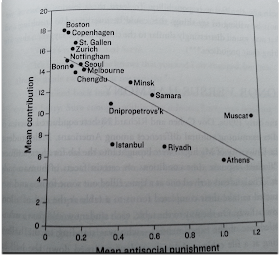There's a fascinating study on cooperation that has been done around the world. I think it reveals why Elizabeth Warren - a policy maker I love - is not ready to be president. Or, more to the point, why the country is not ready for her to be president.
The study measures cooperation and a sense of the common good. Bostonians demonstrate the highest ranking. Here's how the study (the game?) works.
You and 3 partners start out with $20 each. You can choose to put all, some, or none of your $20 into a central pile. Whatever you put in gets doubled and split between the four of you. So, here are a couple of scenarios.
Everybody Wins:
You start with $20.
You put in $20, they each put in $20, and this $80 gets doubled to $160, which you then split.
You end with $40. (So do they.)
The group gains $80.
You Win:
You start with $20.
You put in nothing, they each put in $20, and this $60 gets doubled to $120, which you then split.
You end up with $50. (They get just $30.)
The group gains $60.
Some Win:
You start with $20.
You put in nothing, two other people put in nothing, and one dupe puts in $20, which gets doubled to $40, which you all split.
You end up with $30. (The dupe gets just $10.)
The group gains $20.
Nobody Wins:
You start with $20.
You put in nothing, the same as everyone else. Your nothing is doubled.
You end up with $20. (So does everyone else.)
The group gains $0.
Now curiously, this game has been played in cities around the world. In some cities, people cooperate to create more wealth. In other cities they don't. The culture changes from place to place.
In Boston, the average contribution per round is close to $20. Massachusetts is one of the richest states (3rd as measured by per capita income) and as befits a region dependent on a highly developed market economy and a mix of public and private sector initiatives, people have developed high degrees of interdependence and trust. Copenhagen is close to Boston on this ranking.
On the other end of the spectrum is Athens. In Greece you're the dupe to put your money into the pot and the culture there suggests that people are trying to avoid becoming the dupe. The average contribution per round in Athens is closer to $6, meaning that game participants create about a third of the wealth. (It seems little wonder that Greece has such trouble with public financing and tax collection.)
The good people of Boston demonstrate the highest levels of cooperation and trust in creating a common good of any city studied. And without that sort of culture, two things are difficult to create: economic progress and, more broadly, a progressive agenda. It's not clear that Elizabeth's policies would seem credible outside of certain areas like Boston, California's Bay Area, Austin, North Carolina's Research Triangle ... essentially places with highly educated work forces working in technologies and industries where cooperation is key. It's one thing to articulate policies that create a common good; it's more difficult to know how to create a culture supportive of such policies. It's easier to know what policy initiatives would help the folks in Boston than it is to know how to change Athen's culture.
There is nothing absolute about the efficacy of policy. Whether particular policy works "depends." A policy rarely works in any condition or culture. Curiously, culture change gets talked to quite a lot within corporations but rarely within nations or neighborhoods. Maybe it's time we changed that.


I'm sorry to barge in with something off-topic, but I know you like Bjork so I though you might also like Antony and the Johnsons: http://youtu.be/loNU4fVpO8E
ReplyDelete(Turnabout is fair play, so if you ever want to interrupt one of my music posts with an exciting new economic theory you discovered, feel free!)